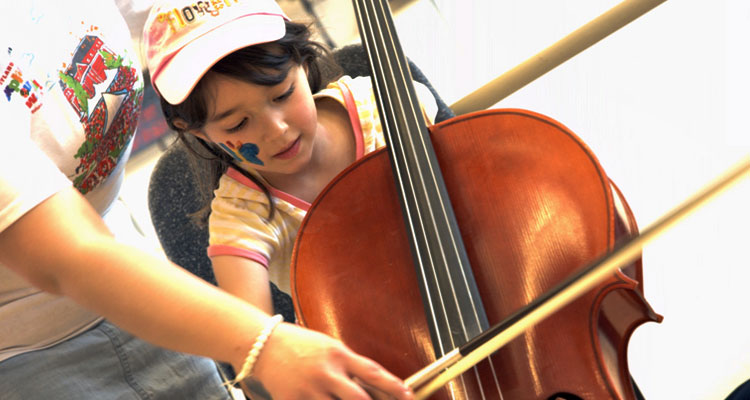Incorporating music into your child’s education is bound to be an exciting endeavor. Music opens up an array of new opportunities and allows your child to nurture his or her creative side. Research has also shown that benefits of learning an instrument include strengthening discipline, developing confidence and enhancing cognitive functions related to verbal and reading skills. In a recent TED-Ed lesson, educator Anita Collins explained how playing an instrument benefits the brain. According to Collins, playing an instrument is the equivalent of a full-body workout, in the sense that it engages essentially every area of the brain at the same time, and practicing an instrument continues to strengthen functions of the brain.
So there’s no question that music education will bring many benefits to your child’s life. But once you’ve decided to pick up an instrument, how do you go about choosing which instrument to play? Here are five of our top tips on how to help your child choose an instrument.
Consider Your Child’s Unique Personality
No two children are the same, so it only makes sense that no two children will learn how to play an instrument in the exact same way. For the highest chances of success when it comes to choosing an instrument that a child will stick with, the child’s unique personality should be taken into consideration. For example, if your child is energetic and high-spirited, he or she may enjoy learning a percussion instrument more than a string instrument. On the other hand, if your child is somewhat quiet and meditative, he or she may prefer playing the acoustic guitar or the piano.
Engage in Musical Activities with Your Child
Instead of just talking with your child about what instrument he or she might like to play, try doing music-related activities to see what piques his or her interest. Expose your child to music by listening to various albums together, watching videos or music-related movies and going to see live performances. You can also check out your local area for musical opportunities, as some music venues offer music education programs, shows or music camps for children.
Take the Time to Shop Around for a Music Teacher
When I taught music, I had many parents tell me that they were looking for a new music teacher because their children didn’t like their previous teacher. Often times though, I observed that it wasn’t so much that the child didn’t like the teacher, but that the child didn’t like the teacher’s teaching style. I encourage parents to shop around and find a teacher from whom your child truly enjoys learning and with whom he or she enjoys spending time. Many music stores offer risk-free trial lessons, so don’t be afraid to talk to potential instructors about your and your child’s likes, dislikes, needs and goals.
Help Your Child Identify a Musical Role Model
Another way to help your child choose an instrument is to identify a role model that your child can look up to. If a child admires and respects a certain figure, he or she is more likely to aspire to become more like that role model by doing what it takes to get there (aka practice). Do some research and identify some musicians that your child may relate to, either on a personal or professional level, and have your child read about and watch videos of those musicians. When facing difficulties and frustrations with practicing down the road (and there will be some), your child can draw inspiration and encouragement from his or her musical role model.
Discuss Long-Term Activities Related to the Instrument
Playing a musical instrument often presents other opportunities that should be taken into consideration. For example, if your child chooses to play the violin or cello, there will be opportunities to join an orchestra, play in the pit for a musical or even perform at weddings. If your child chooses to play the guitar or drums, he or she may want to get further practice by joining a band later on. If your child is on the fence about which instrument to choose, talking to him or her about the related long-term activities may help sway his or her decision.
Bottom Line
Whichever instrument your child ends up choosing, make sure it is something that will ultimately enrich his or her life by bringing joy, teaching new skills and presenting new opportunities. It is uncommon for children to truly master an instrument, but if through music, they can develop the discipline to continually set and accomplish their personal goals, their musical experience will likely be a rewarding one.
You can find more information about music, such as music education and music-related games and apps, here on Learning Liftoff.
[schedule on=’2015-07-01′ at=”07:00″ expon=’2015-07-31′ expat=”23:55″]If your child has already begun learning how to play an instrument, encourage him or her to enter K12’s Music Showcase for the chance to win an iTunes gift card or even win Best in Show! In order to be eligible for prizes, entries must be submitted before 5 PM (ET) on Friday, July 31, 2015.[/schedule]
Featured Image – Steve Snodgrass / CC by 2.0






















































































































